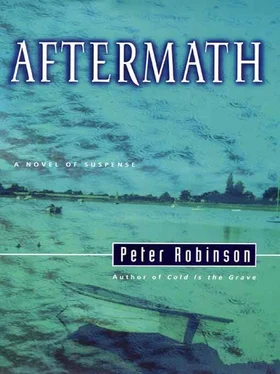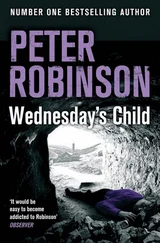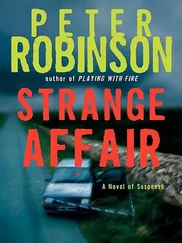“Maybe she didn’t.”
“What do you mean?”
“Maybe Mr. Payne gave her a lift.”
“You told the police you didn’t see him. You didn’t, did you?”
“No. But he could have been waiting outside, couldn’t he?”
“I suppose so,” Maggie admitted.
“I hate him. I’m glad he’s dead. And I hate Nicky Gallagher. I hate all men.”
Maggie didn’t know what to say to that. She could tell Claire that she’d get over it in time, but a fat lot of good that would do. The best thing she could do, she decided, was have a talk with Mrs. Toth and see if they could persuade Claire to go for counseling before things got worse. At least she seemed to want to talk about her thoughts and feelings, which was a good start.
“Was she conscious all the time he was doing stuff with her?” she asked. “I mean, was she aware of him doing it to her?”
“Claire, stop it.” But Maggie was spared further debate by the phone. She listened, frowning, said a few words and then turned back to Claire, who managed to pull herself out of her absorption with Kimberley’s ordeal for a moment and ask her who it was.
“It was the local television station,” Maggie said, wondering if she sounded as stunned as she felt.
A flicker of interest. “What did they want?”
“They want me to go on the local news show tonight.”
“What did you say?”
“I said yes,” said Maggie, as if she couldn’t quite believe it herself.
“Cool,” said Claire, squeezing out a tiny smile.
There are many English seaside resorts that look as if they have seen better days. Withernsea looked as if it had never seen any good days at all. The sun was shining over the rest of the island, but you wouldn’t know it at Withernsea. A vicious cold rain slanted in from the iron sky, and waves from a North Sea the color of stained underwear churned up dirty sand and pebbles on the beach. Set back from the front was a strip of gift shops, amusement arcades and bingo halls, their bright-colored lights garish and lurid in the gloomy afternoon, the bingo caller’s amplified “Number nine, doctor’s orders!” pathetic as it sounded along the deserted promenade.
The whole thing reminded Banks of long ago childhood holidays at Great Yarmouth, Blackpool or Scarborough. July or August days when it seemed to rain nonstop for two weeks, and all he could do was wander around the amusement arcades losing pennies in the one-armed bandits and watching the mechanical claw drop the shiny cigarette lighter just before it reached the winner’s chute. He had never played bingo, but had often watched the hard-faced peroxide women sit there game after game, chain-smoking and staring down at the little numbers on their cards.
On better days, and when he reached his teens, Banks would spend his time searching through the secondhand bookshops for the old Pan books of horror stories or steamy bestsellers such as The Carpetbaggers and Peyton Place . When he was thirteen or fourteen, feeling way too grown-up to be on holiday with his parents, he would wander off alone for the day, hanging around in coffee bars and browsing through the latest singles in Woolworth’s or a local record shop. Sometimes he would meet a girl in the same predicament, and he had had his first adolescent kisses and tentative gropings on these holidays.
Banks parked by the seafront and, without even stopping for a look at the water, hurried to the house directly across from him, where retired DI George Woodward now ran his B amp;B. The VACANCIES sign swung in the wind and creaked like a shutter on a haunted house. By the time Banks rang the front doorbell he was cold and soaked to the skin.
George Woodward was a dapper man with gray hair, bristly mustache and the watchful eyes of an ex-copper. There was also an aura of the hangdog about him, most noticeable as he looked over Banks’s shoulder at the weather and shook his head slowly. “I did suggest Torquay,” he said, “but the wife’s mother lives here in Withernsea.” He ushered Banks in. “Ah, well, it’s not that bad. You’ve just come on a miserable day, that’s all. Early in the season, too. You should see it when the sun’s shining and the place is full. A different world altogether.”
Banks wondered on which day of the year that momentous event occurred, but he kept silent. No point antagonizing George Woodward.
They were in a large room with a bay window and several tables, clearly the breakfast room where the lucky guests hurried down for their bacon and eggs every morning. The tables were laid out with white linen, but there were no knives and forks, and Banks wondered if the Woodwards had any guests at all at the moment. Without offering tea or anything stronger, George Woodward sat at one of the tables and bade Banks sit opposite.
“It’s about Alderthorpe, is it, then?”
“Yes.” Banks had spoken with Jenny Fuller on his mobile on his way out to Withernsea and learned what Elizabeth Bell, the social worker, had to say. Now he was after the policeman’s perspective.
“I always thought that would come back to haunt us one day.”
“How do you mean?”
“Damage like that. It doesn’t go away. It festers.”
“I suppose you’ve got a point.” Like Jenny had with Elizabeth Bell, Banks decided he had to trust George Woodward. “I’m here about Lucy Payne,” he said, watching Woodward’s expression. “Linda Godwin, as was. But that’s between you and me for the moment.”
Woodward paled and whistled between his teeth. “My God, I’d never have believed it. Linda Godwin?”
“That’s right.”
“I saw her picture in the paper, but I didn’t recognize her. The poor lass.”
“Not anymore.”
“Surely you can’t think she had anything to do with those girls?”
“We don’t know what to think. That’s the problem. She’s claiming loss of memory. There’s some circumstantial evidence, but not much. You know the sort of thing I mean.”
“What’s your instinct?”
“That she’s more involved than she’s saying. Whether she’s an accessory or not, I don’t know.”
“You realize she was only a twelve-year-old girl when I met her?”
“Yes.”
“Twelve going on forty, the responsibility she had.”
“Responsibility?” Jenny had said something about Lucy taking care of the younger children; he wondered if this was what Woodward meant.
“Yes. She was the eldest. For Christ’s sake, man, she had a ten-year-old brother who was being regularly buggered by his father and uncle and there wasn’t a damn thing she could do about it. They were doing it to her , too. Can you even begin to imagine how all that made her feel?”
Banks admitted he couldn’t. “Mind if I smoke?” he asked.
“I’ll get you an ashtray. You’re lucky Mary’s over at her mother’s.” He winked. “She’d never allow it.” Woodward produced a heavy glass ashtray from the cupboard by the door and surprised Banks by pulling a crumpled packet of Embassy Regal from the shirt pocket under his beige V-neck sweater. He then went on to surprise him even further by suggesting a wee dram. “Nowt fancy, mind. Just Bell’s.”
“Bell’s would be fine,” said Banks. He’d have just the one, as he had a long drive home. The first sip, after they clinked glasses, tasted wonderful. It was everything to do with the cold rain lashing at the bay windows.
“Did you get to know Lucy at all?” he asked.
Woodward sipped his Bell’s neat and grimaced. “Barely spoke to her. Or any of the kids, for that matter. We left them to the social workers. We’d enough on our hands with the parents.”
“Can you tell me how it went down?”
Читать дальше












